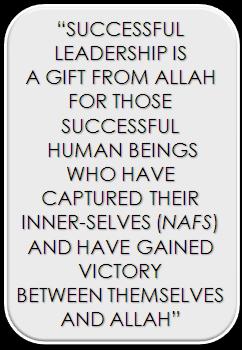|
||||||||||||||||||||||||||||||||||||||

|
||||||||||||||||||||||||||||||||||||||
 |
||||||||||||||||||||||||||||||||||||||
|
|
||||||||||||||||||||||||||||||||||||||
|
|
Leadership: A Void
|
|||||||||||||||||||||||||||||||||||||
|
|
Allah SWT has created this world in perfect order; all the galaxies, sun, moon, weather, and seasons are running with certain order and discipline. If we follow the system that Allah SWT has established we will flourish and prosper, and when we try to break away from this system—even if we attain temporary success, in the long run we will falter and suffer. Allah SWT has given humans a variety of personalities, but all of us are either leaders or followers by nature and by assignments that Allah SWT has allocated for us. |
Prophet Muhammad SAW said:
“All of you are guardians and are responsible for your wards. The ruler is a guardian and responsible for his subjects; the man is a guardian of his family; the woman is guardian in her husband’s house and responsible for her wards; a servant is guardian of his master’s property and responsible for his ward. So all of you are guardians and are responsible for your wards.” (Bukhari and Muslim)
As Muslims, we have to be the best followers or leaders depending on our personalities and role in life.
Prophet Muhammad SAW said:
“Allah loves a servant who when performing a task does so skillfully.” (Al-Bayhaqi)
In Islam, we have the best role models to follow both as leaders and followers. Rasul Allah SAW was the best leader that ever existed and his sunnah is enough to give us all the guidelines on how to be, as well as produce great leaders. Allah SWT had chosen and perfected Muhammad SAW; we can never be like him but his characters and manners are so simple yet powerful that they are a guide for people till the end of times.
 |
Rasul Allah SAW was able to produce amazing leaders as well as remarkable followers. All the qualities that we will discuss in this article are derived from the methods of Muhammad SAW. After him SAW we have AbuBakr (RA), ‘Umar (RA), ‘Uthman (RA), ‘Ali (RA) and ‘Umar Ibn Abdul Aziz (R) as shining examples for the entire world. They were all unique in their abilities and techniques, yet astonishingly similar in their leadership qualities. Companions of the Prophet SAW used to say that the secret of leadership is to deny yourself completely; put everyone before you and think of |
Throughout this article you will notice that the qualities of a successful leader formulate a perfect circle. All of them stem from iman (faith) in Allah and the more iman a person has, the more he will have leadership qualities. Successful leadership is a gift from Allah for those successful human beings who have captured their inner-selves (nafs) and have gained victory between themselves and Allah. 1
At the same time for the success of any mission, leaders need followers—those who are willing to obey while disregarding their own nafs for the sake of Allah in order to get the job done. So at any given time and in all circumstances, leaders and follower both should be concerned about developing themselves to the best of their abilities.
At any given time, you will either be a leader or a follower. If you are a leader follow Allah and His messenger and do your best. And if you are a follower, fear Allah and be the best follower by obeying and supporting your leader.
Below we will discuss the qualities of true leaders that are derived from the teachings and practices of Muhammad SAW and his companions.
|
 |
Let’s look at ‘Umar (RA)’s example as a leader. ‘Umar (RA) was very tough by nature but upon becoming Khalifah, he got up on the pulpit in front of everyone and made du’a to Allah and asked Him SWT to make him soft. He (RA) didn’t hide his weakness; in fact he acknowledged it in front of everyone. This is ultimate sincerity— it is a status when praise and criticism become equal in the person’s eye.
- Consideration:
Allah SWT has created every human differently with a unique set of qualities. A leader respects everyone’s qualities and limitations. He cannot push people the way he wants. Companions of the Prophet SAW were unique and had individual qualities that were nurtured by Prophet Muhammad SAW who assigned them tasks based on their respective abilities.
This takes humility on the part of the leader because if he is arrogant, he would want to formulate people a certain way which may break the followers’ heart and soul along with wasting his own energy and time; and at the end will not bear any fruits.
 |
|
As we stated earlier everyone is a follower or a leader at any given time. You should follow the same principal on every level—be it family, job, or nation. The companions of Prophet SAW used to evaluate the status of their iman according to the behavior of their mules and horses. The more a person is closer to Allah the more he will command respect and obedience from those around him, including animals.
So the quality of a true believer and a great leader is that he holds himself responsible instead of others. If the situation goes wrong, he accepts full responsibility of the actions and tries to rectify the situation, not accuse or oppress his subordinates.
- Consultation:
Leadership is consultation. Rasul Allah SAW always consulted people around him. The purpose of consultation is to unite the hearts which brings down the mercy of Allah. Allah SWT himself advised the Prophet on consultation and softness in the following words:

So by mercy from Allah, [O Muhammad], you were lenient with them. And if you had been rude [in speech] and harsh in heart, they would have disbanded from about you.
(3:159)
|
Once Muslims were traveling and when they were ready to camp Rasul Allah SAW chose a certain location. His companions asked him if this decision was based on wahee (revelation) or it was his own idea. When he notified them that it was his own idea they disagreed with it and suggested another location based on their knowledge of the area. Prophet SAW immediately abandoned his original proposal and followed theirs. Muhammad SAW didn’t get offended or thought his companions’ disagreement a disrespectful act. Again, we go back to sincerity—the purpose of leading and following is to get the job done in the best possible way. |
 |
Once the leader opens up the door of consultation, he in reality empowers everyone under his command which develops a sense of camaraderie and equal responsibility and thus produces best results. One the other hand, a leader who bosses everyone around instead of consulting them develops hatred and enmity for himself in the hearts of his followers.
Anas ibn Malik (RA) said that Allah's Messenger SAW cursed a man who acts as their (people’s) imam though they dislike him… (At-Tirmidhi)The real wisdom of consultation is to come up with the best possible advice and solution for the goal. When all members bring in their advice and share it, not only does it open up hearts and minds, it allows a discussion to take place which generates the best possible outcome.
All successful major companies follow this technique where they have team or unit meetings and managers take everyone’s opinion before making final decisions. This not only gives the followers a feeling of ownership of the project, it also produces love and respect for the leader.
 |
|
- Stability:
A leader has to have stable iman, temper, personality, goal, and vision. He cannot be one way today and act differently tomorrow. It will cause confusion among the followers and will remove his respect from their hearts. A leader is like a sponge that absorbs all the mess and does not allow it to spread everywhere. Even if the follower are unstable and in a state of chaos and confusion but the leader is calm, this calmness will radiate and affect others. Irritability and enflamed temper are signs of a defeated person who does not know how to deal with situations. If this is the attitude of the leader, than he has already failed in his task.
How a leader stabilizes his followers depends on his personality, situation, place, times, and the kind of people he is leading. The key of his success in this endeavor is his stable character of kindness, consideration, generosity, humbleness, involving people in decision making process, sharing the profits or success with the entire group—basically the qualities of a true believer in Allah SWT.
- Farsightedness:
A successful leader always has his eyes on the prize. There are many things that will go wrong while working on a task and there are many people who will cross their limits. What makes one organization or group different from the other is how the leader deals with situations like these. Sacrificing the ego over short term losses for the long term benefits is always a better option.
Let’s take the example of a work place; if the manager gets upset with some trained workers and causes them to leave, he would have to hire new people and train them. It will take a lot of time, patience, and many mistakes before the new workers are at the level of those that were removed. This will end up costing the company more loss and suffering than if he were to overcome his annoyance and save the original workers. This brings the issue back to humbleness and humility and elimination of ego for the higher purpose.
|
'Umar( RA) was once delivering a speech and he had a new thobe (dress) on. The dress was made out of a piece of cloth that was distributed among the men of Medina, and everyone had received an equal amount. One man from the congregation got up and questioned ‘Umar about the amount of cloth he had received saying it was bigger than most people’s. ‘Umar (RA) called his son ‘Abdullah to clarify the situation who explained that due to the tall height of his father, he had given his own share to him which is why it was bigger than most. The man was satisfied and sat back down. 'Umar (RA) was not the manager of a small company, he was the ruler of a strong Muslim Empire, yet his level of humility was so high that all people had the right to address their questions and concerns without any fear of retribution. |
 |
- Wisdom:
- The one who has love of dunya (this world) in his heart.
- The one who worries about tomorrow.
- If a person worries about the future, it means that he has no trust in Allah SWT.
- Envious and jealous person.
- Rasul Allah SAW said: "Haasid (envious person) is the enemy of Allah." There is a story attributed to a Pharaoh of Egypt who used to build intricate buildings with hidden passages and then kill the builders so no one besides him will have the knowledge of these secret passages.
Once he heard a knock on one of these secret passage doors, he was very surprised and opened the door. The visitor introduced himself as Satan and said to Pharaoh "you are in big trouble, I disobeyed Allah once and look at what He SWT did to me. You call yourself the supreme Lord; you are going to be worse off than I am." He then went on to say, "there is someone who is more hated in the eyes of Allah than both of us and that is a Haasid—someone who is not pleased with what Allah has given him and looks to others" - The one who doesn't rely on Allah.
- The one who doesn't rely on Allah is full of ego and arrogance. Every success should produce sajda shukr (prostration of gratitude) and every mistake should produce istighfar and tawba (repentance) as Allah is owner of all affairs. Since Allah grants wisdom to those He loves; once a person becomes beloved to Allah, he will be granted wisdom. And those who want to become beloved to Allah have to perform actions that garner Allah's love.
Wisdom is a gift from Allah SWT; it is to act at any given time, place, and condition in a way that benefits you the most. Allah SWT says:

He gives wisdom to whom He wills, and whoever has been given wisdom has certainly been given much good. And none will remember except those of understanding. (2:269)
Ali RA said: Allah gives wisdom to whom He loves but He will not give it to four:
Since Allah grants wisdom to those He loves; once a person becomes beloved to Allah, he will be granted wisdom. And those who want to become beloved to Allah have to perform actions that garner Allah's love.
 |
|
- Farasa/Baseera (Inner Vision from Allah):
Baseera is internal vision and ability to see hidden meanings behind apparent situations and words. It is transmitted directly from Allah SWT to the believers.
Uthman Ibn 'Affan RA is reported to have said:
"Be careful (be aware) of the vision of a believer because he sees with the light of Allah…"(Al Moajam Kabir)
A leader whose heart is connected to Allah can feel what's going on around him right away and makes decisions accordingly. Allah can give leader hidden messages and based on that a leader is able to feel his people—what they need, want and what pleases them.
- Humility:
Leadership requires true humbleness and humility towards Allah and people. Once a woman corrected 'Umar in the middle of a congregation over something he said; and he immediately recognized and acknowledged his mistake.
A leader has to respect the environment, time, place, condition and those he is dealing with. Khulafa Rashideen (righteous caliphs) were all different in qualities and dealt with people according to their traits while holding onto certain principals. |
 |
- Leader has to be humble enough to accept the advice of people around him.
- Followers affect the leader, his decisions, and overall environment just like a leader affects his followers.
Once a man approached 'Ali (RA) during the caliphate of 'Uthman (RA) and criticized them both and compared the time with that of 'Umar and AbuBakr (RA). 'Ali (RA) replied saying AbuBakr and 'Umar had people like me and 'Uthman to give them advice, whereas we have people like you.
We can take two points from this humorous yet important story:
A leader has to be humble enough to accept change and respect it. Our world is constantly changing— weather changes, situations change, hearts change, age changes, people change. Acceptance of change is the strength of a leader.
- Fairness/Mercy:
Allah SWT advised Prophet Muhammad SAW to be kind and merciful to his followers in the following words:

And lower to them the wing of humility out of mercy (17:24)
Prophet Muhammad SAW said:
"None of you is a believer until he loves for his brother (his fellow Muslims) what he loves for himself." (Muslim)
 |
If we as a leader and a follower implement only this principal in our lives, we will be successful at our respective tasks. As we mentioned the words of a sage earlier: "At any given time, you will either be a leader or a follower. If you are a leader follow Allah and His messenger and do your best; and if you are a follower, fear Allah and be the best follower by obeying and supporting your leader." If a leader loves for his follower what he loves for himself, then he will be kind, considerate, generous, easy going, compassionate—meaning he will have all the qualities that are needed to unite the hearts to him. At the same time, if the follower loves for his leader what he loves for |
One of the major disasters the Muslim Ummah is facing is lack of leadership. We, as a nation, are bereft of leaders and it is critical to fill this void. We have to go back to the true teachings of Islam and develop ourselves as true Muslims, Mo`minoon (believers), 'Abd (slaves); develop true humility, even towards animals. We have to eradicate all arrogance from our hearts and return all our accomplishments to their true source—Allah SWT.
A sincere leader does not look for a pat on the shoulder or acknowledgement from others. Even if people treat him low, he takes it with humility and continues doing his best since a true believer does not seek reward from anyone other than Allah. A wise person advised me to "be a rug!" A rug is mistreated and everyone walks all over it but it is the reason the rest of the house remains clean. It receives all the dirt but protects everything else around it.
It is reported in earlier traditions that the master of the people is the one who serves them.
If a person wants to be a true leader and win people's hearts, he has to humble himself and serve them.
|
A leader has to be most vigilant of people and has to constantly water his soul and faith. He has to be physically, spiritually, and emotionally fit. He holds the responsibility of guiding and leading others on his shoulders, so anytime he acts irresponsibly, his followers will be worse. There was once a wise king who was out on a hunting expedition when his entourage realized that they were out of salt. A few people were sent out to get salt from the nearby locality; when they were about to leave the king called them over and stressed that they pay for the salt. People asked |
 |
Therefore, we can establish that followers are the mirror of their leader. Anytime they are acting imprudently, it is the leader's fault and the right course of action for him at this time is to repent and fix himself spiritually.
Allah SWT stresses this point in the following words:

Indeed, Allah will not change the condition of a people until they change what is in themselves. (13:11)
An accepted leader shows humility to Allah SWT for all his success and accomplishments. The more he is given victory, the more his good qualities—humbleness, generosity, kindness, spending in the path of Allah—increase. This is the key to more success since Allah SWT promised:

And [remember] when your Lord proclaimed, 'If you are grateful, I will surely increase you [in favor]; but if you deny, indeed, My punishment is severe.'" (14:7)
 |
Shukr (gratitude) is the ornament of a believer. The more he gives shukr, the more his countenance—physically and spiritually—becomes beautiful. The real shukr is expressed through actions—of the tongue, heart, and body. The gratitude of tongue is to be moist with the remembrance of Allah and talking about Him SWT; the gratitude of the heart is to be content; and gratitude of body is to be humble and show humility towards everyone. Leadership is a skill; it is an art—either a person |
If we truly belong to Allah SWT we will be wonderful leaders and great followers depending on our role. May Allah SWT decorate us with the qualities of true followers of Prophet Muhammad SAW; may He allow us to be those beloved slaves of Him who when performing a task do so skillfully. May He grant us true humility which will be a cause of our elevation and success in this life and the hereafter. Ameen.
1 Refer to article series "Journey of Victory vs. Journey of Defeat"

If You Liked This Article, Please Download it, Print it, and Share it:
Just 'Right-Click' on the button of your choice and choose 'save target as'






